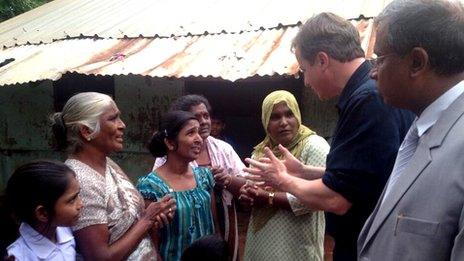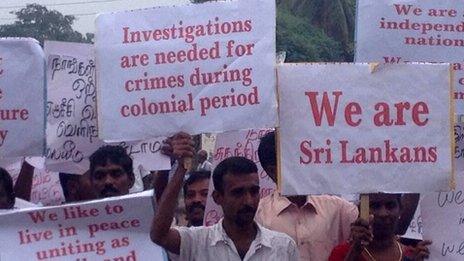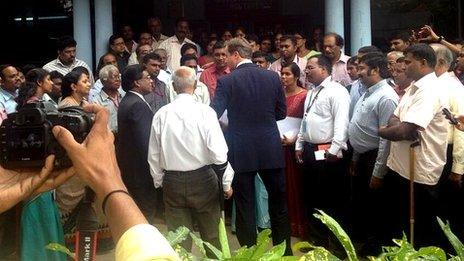Cameron in Northern Sri Lanka
- Published

David Cameron meets a family in Tamil refugee camp
David Cameron has just landed in Northern Sri Lanka, becoming the first prime minister, the first world leader, to travel to the north of this island, once controlled by the Tamil Tigers.
No longer, of course, after the bloody and brutal end of a quarter a century of civil war.
When the prime minister arrived here in Jaffna to visit a public library that is seen as the cultural heart of the Tamil community, he was greeted by two rival demonstrations.
On one side of the road, there was a group of clearly pro-regime demonstrators who, amusingly, carried almost identical printed signs written in English.
When I approached this group I could not find a single one of them who spoke English.
They were calling for an inquiry - not into the crimes of the civil war, or the alleged war crimes of their own president, but into colonial abuses, Britain's behaviour here many decades ago.

Pro-regime protesters want an inquiry.... into colonial crimes
Their rival group, composed largely of women, was equally well-organised. As the prime minister arrived they rushed forward to try to see him and were held back by police.
They were carrying in their hands identically laminated pictures of their loved ones, the so-called disappeared - sons, daughters, mothers and fathers who went missing during the civil war.
The prime minister is walking a tightrope on this trip. When he returns from meeting Tamil leaders in the north he will go back to the Commonwealth summit, in the capital Colombo - a summit boycotted by Canadian, Indian and Mauritian leaders - for a face-to-face meeting with the Sri Lankan president.
Mr Cameron has said there are sufficient allegations of war crimes - and ongoing human rights abuses - against President Mahinda Rajapaksa and his government to warrant international inquiries.
He says he is shining a light on what is happening in this country - and that there is some value in diplomacy. In not merely boycotting what is going on.

Mr Cameron visited staff from the Uthayan newspaper, whose printing presses were burnt to the ground in a recent attack
As his entourage was leaving the public library, a group of screaming women - desperate to make their representations directly to the first world leader to come here - pressed photographs and petitions into our hands.
One of them was thrown to the floor as she tried to get to the prime minister's convoy.
Mr Cameron has certainly been made aware of the human price of a bloody civil war.